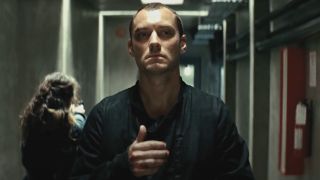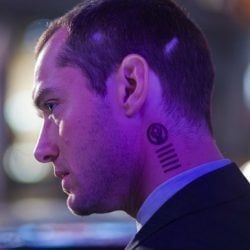Exclusive Interview: Repo Men Director Miguel Sapochnik

When Miguel Sapochnik took on the duty of directing Repo Men, he came in like many first-time directors-- armed with a list of movies he admired that he wanted to reference. But unlike lots of directors who would rather die than admit the idea for killing someone in a hallway with a hammer came from Oldboy, Sapochnik wears his movie influences on his sleeve-- during a press conference he brought up A Clockwork Orange, Robocop and even Monty Python's Meaning of Life as inspiration for his film.
And yes, his movie set in a dingy futuristic Los Angeles where people hunt down artificial beings has a little bit of Blade Runner in it too, and he doesn't mind the comparison. "Better Blade Runner than Demolition Man," he told me in our later conversation. In fact he imagines Repo Men as taking place about 25 years before Ridley Scott's seminal sci-fi film, in which people are "building the foundations of that world." The Asian influence in the Los Angeles of Blade Runner becomes an economy completely dominated by China, and the flying cars Deckard uses are still in the prototype phase-- Sapochnik told me his film initially included news reports on more flying car test deaths.
Set in a world where artificial organs are produced by a mammoth corporation, Repo Men stars Jude Law and Forest Whitaker as a pair of, well, repo men-- killers hired by the corporation to find people overdue on payments for their organ, slice them open and reclaim the property. It's bloody work, but the two lifelong friends revel in it having been desensitized to violence by both the brutal society around them and a long stint in the military. The film's action picks up when Law's character is outfitted with an artificial heart, and unable to pay, must go on the run and fight his very employer in the process.

Even though Repo Men is primarily a fast-paced, darkly funny action film, Sapochnik's idiosyncratic touch is felt in nearly every part of the film, starting from the opening scene. As the camera pans into a bombed-out building, past rubble and garbage, to find Jude Law at a typewriter, the strains of a Rosemary Clooney standard play in the background. Sapochnik says the movie's unconventional music choices-- which also include Nina Simone's "Feelin' Good -- have nothing to do with the title of th enovel the movie is based on, Repossession Mambo. "Music is my second love," Sapochnik told me. He went through nearly 200 songs before picking the Clooney song in the end.
Other choices were tricky not because of artistic intent, but the classic problem for any film-- money. In a climactic fight near the end of the film, Jude Law's character must fight his way past a cadre of armed guards in a long and narrow hallway-- a clear reference to Park Chan-Wook's Oldboy that practically winks at the camera when Law grabs a hammer. As Sapochnik told me, he initially asked for a 150 foot hallway, then 75 feet, then finally settled for 50 feet when the 75 foot version was so narrow Law couldn't swing a hatchet (I promise it makes sense in the film). As the shooting day went on it looked as if Law wouldn't have time to make it past all the henchmen, and two would need to run away rather than be vanquished. As Sapochnik puts it, Law looked at him and said "No they're fucking not! Give me the hammer, give me the knife." The star got the final shot done in under an hour.
When asked during the press conference if he had to fight for his vision of the film, Sapochnik replied "Fuck yeah." He told me later that, despite being a first-timer with no films to back him up, "I think it's my job to fight. The studio makes you question your idea and you have to prove it." Though Repo Men took its time coming to theaters, and Sapochnik had to cut out large chunks of the back story-- including a 35 minute explanation that Law's character and Alice Braga's, who fall in love in the film, has previously been married-- he clearly believes in the strange, violent, Monty Python-inspired film that bears his name.
Read below for more of what Sapochnik had to say during the press conference. Repo Men opens this Friday.
CINEMABLEND NEWSLETTER
Your Daily Blend of Entertainment News

What tone were you reaching for overall, and were you intentionally avoiding action movie cliches?
Generally a fucked-up tone. We were trying to walk the line between something that was entertaining and something that had an element of satire in it. A good way of explaining what the tone of the movie we were going for is by movies that influenced it. A Clockwork Orange, Brazil, the sketch from Monty Python's Meaning of Life-- Monty Python in general. Trainspotting had a big influence on me. I worked on Trainspotting-- it was the first film I worked on, so it affected me. We were just trying to walk the line. It was always about being humorous, not taking ourselves too seriously. The idea was to not fall into the trap of making everything really dark and pessimistic. Because the subject matter is dark. We're not talking about a bright future. We're talking about a fucked-up, corporate future.
B>You don't explain how we got to this point in the future. Can you talk about that choice?
It was a very specific choice. I love all sorts of movies, I grew up on Schwarzenegger and Tarkovsky and tried to mesh them together with this movie. [laughs] The fact is, I don't think anything terrible happened-- anything more terrible than what's happened now. We were not a topical subject when we first wrote the script. It's amazing how topical it became.
Would you rather people either love or hate the film than be wishy-washy?
I have ambivalence. You can love it, you hate it. Ambivalence is the death of us all.
What was some of the stuff you had to cut that you really miss?
[Sapochnik describes a flashback scene in which Remy and Jake are serving together in the military and are getting on each others nerves] I didn't tell [Jude] to do this-- he pulls out this poem, and he reads this poem to Forest, which is about Jake and Remy's characters. I was sitting there, I couldn't believe he had actually thought about this before, and this was an idea. If you look at the footage, Forest's reaction is the same. Just for a moment his acting drops. It was beautiful, but it took too fucking long. That's why they have the director's edition, the collector's edition, the director's collection edition.
Were they always your first choice?
I didn't necessarily choose Jude. Jude read the script and asked for me. And then Forest, we were really bloody lucky. Because he had just won an Oscar, so why would he want to do a genre movie with a bunch of dirty jokes in it? But for some reason that was enticing.
What will we see in the unrated cut or the director's cut?
I already did the unrated cut, which I guess I kind of hijacked and turned into the director's cut of the movie. The unrated cut really focuses on, more than anything else, it goes into some detail of the relationship, the lost relationship between Remy and Carol, and Remy and his son Peter.
There was a subplot that existed in the movie where Beth [Alice Braga's character] was originally Remy's first wife that he met the weekend before going to war. There's a whole 35 minute sequence about them meeting, and it consequently changes the focus of many scenes in the film. We took that out ultimately, trying to streamline the project. And probably to better effect. But it was very interesting to try and do that without reshooting anything. To find within the existing scene ways of getting around the elephant in the room, which is that these characters have known each other for 10 years rather than they just met.
Do you think there are any good guys in this movie? I don't think I've ever met a really good guy or really bad guy. It's yin and yang and that's what makes humans interesting.
Staff Writer at CinemaBlend
Most Popular




